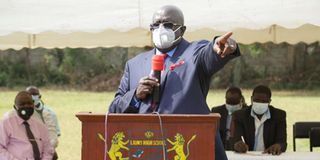Caning will put teachers in conflict with learners

Education Cabinet Secretary Prof George Magoha speaks at Lions High School in Kisumu.
What you need to know:
- We can still restore sanity and order in schools and harmonious coexistence between teachers and students without physical punishment.
- If corporal punishment is a must, let the government post police officers to schools to be doing the caning job.
In ratifying the UN Convention on the Rights of Children, Kenya took the obligation to implement them. Article 28 (2) states that school discipline methods should be “consistent with the child’s human dignity and in conformity with the Convention”.
The UN Committee on the Rights of Children, which monitors the implementation of the convention, interprets this article as requiring prohibition of corporal punishment in schools.
To mull reintroduction of corporal punishment as cases of indiscipline spiral in schools is, therefore, akin to rolling back the gains we have made since caning and other forms of corporal punishment were outlawed in Kenya in 2001 through Section 36 of the Basic Education Act and Children Act.
We can still restore sanity and order in schools and harmonious coexistence between teachers and students without physical punishment. Indiscipline results from a combination of factors — including the child’s circumstances, the school environment, the nature and perception of the teaching profession and the adequacy of the curriculum. A child’s behaviour does not necessitate a violent response.
Use of physical force, no matter how light, to cause deliberate bodily pain or discomfort in response to some undesired behaviour by students can put teachers in permanent conflict with learners. This does not augur well with learning.
If corporal punishment is a must, let the government post police officers to schools to be doing the caning job because the teenagers are likely to kill teachers.
Meted out sparingly
Punishment should be meted out sparingly on headstrong, stubborn, obstinate, unruly, unsteady and generally wayward students. This includes suspension, menial work, expulsion, isolation, detention after school, scolding, being sent to the head teacher or principal and deprivation of privileges.
Besides, punishment is most effective when it is predetermined and planned; it does not work well as an impulsive reaction. When you become angry, you act as a model for negative behaviour. You will not be teaching the child to make better decisions.
If students burn schools because they want to go home, the government should abolish boarding schools and have quality day schools countrywide.
The employer, Teachers Service Commission (TSC), should work with the Ministry of Education and other line agencies to re-evaluate the profession, the environment under which teachers work and, more importantly, the conditions under which students learn to shed light on the situation.
Teachers may be underpaid and undervalued and classrooms large and schools poorly resourced with inadequate teaching tools and infrastructure, poor sanitary conditions and understaffed. This can diminish teachers’ patience and result in angry and inappropriate response to children’s behaviour.
Prohibiting corporal punishment in schools is the only safe foundation for children’s protection as physical punishment often has negative repercussions for the teacher and the school involved.
Mr Sossion is a nominated MP and the Secretary-General of the Kenya National Teachers Union (Knut)





